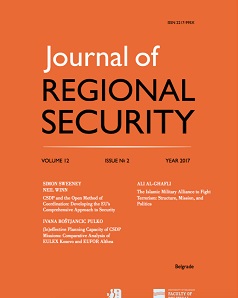CSDP and the Open Method of Coordination: Developing the EU’s Comprehensive Approach to Security
CSDP and the Open Method of Coordination: Developing the EU’s Comprehensive Approach to Security
Author(s): Simon Sweeney, Neil WinnSubject(s): Security and defense, EU-Approach / EU-Accession / EU-Development
Published by: Fakultet političkih nauka Univerziteta u Beogradu
Keywords: European Union (EU); Common Security and Defence Policy (CSDP); intergovernmentalism; Open Method of Coordination (OMC); Permanent Structured Cooperation (PESCO); EU foreign; defence and security poli
Summary/Abstract: How can we best describe the operation of the Common Security and Defence Policy (CSDP), and how can we improve policy-making in CSDP? The Open Method of Coordination (OMC) is predicated on the conviction that there are clear limits to the extent that European Union (EU) foreign and security policy can be strengthened through the restricting tendencies of intergovernmental cooperation between EU member states. Permanent Structured Cooperation (PESCO) – agreed by the European Council and 25 EU member states in 2017 – offers practical instruments towards delivering value-added capacity to the process of crisis management beyond intergovernmentalism. As a process, PESCO is analogous to the logic of OMC, including more appropriate levels of coordination at the national organisational level in order to effectively facilitate the EU’s comprehensive approach to conflict prevention and crisis management. The requirement for new and “open” types of EU foreign and security policy coordination is underlined by the immense differences between EU member states in external policy, both concerning national crisis management structures and the resulting inefficient segmentation of policy at the EU level.
Journal: Journal of Regional Security
- Issue Year: XII/2017
- Issue No: 2
- Page Range: 95-122
- Page Count: 28
- Language: English

